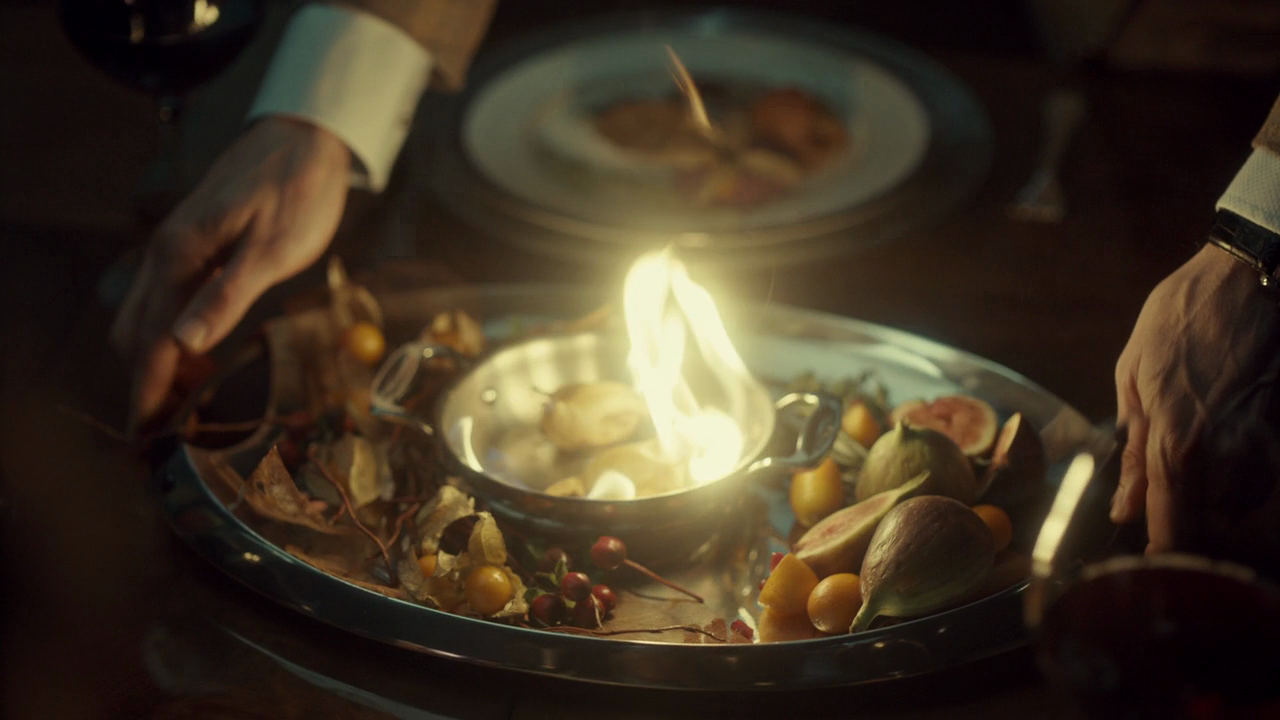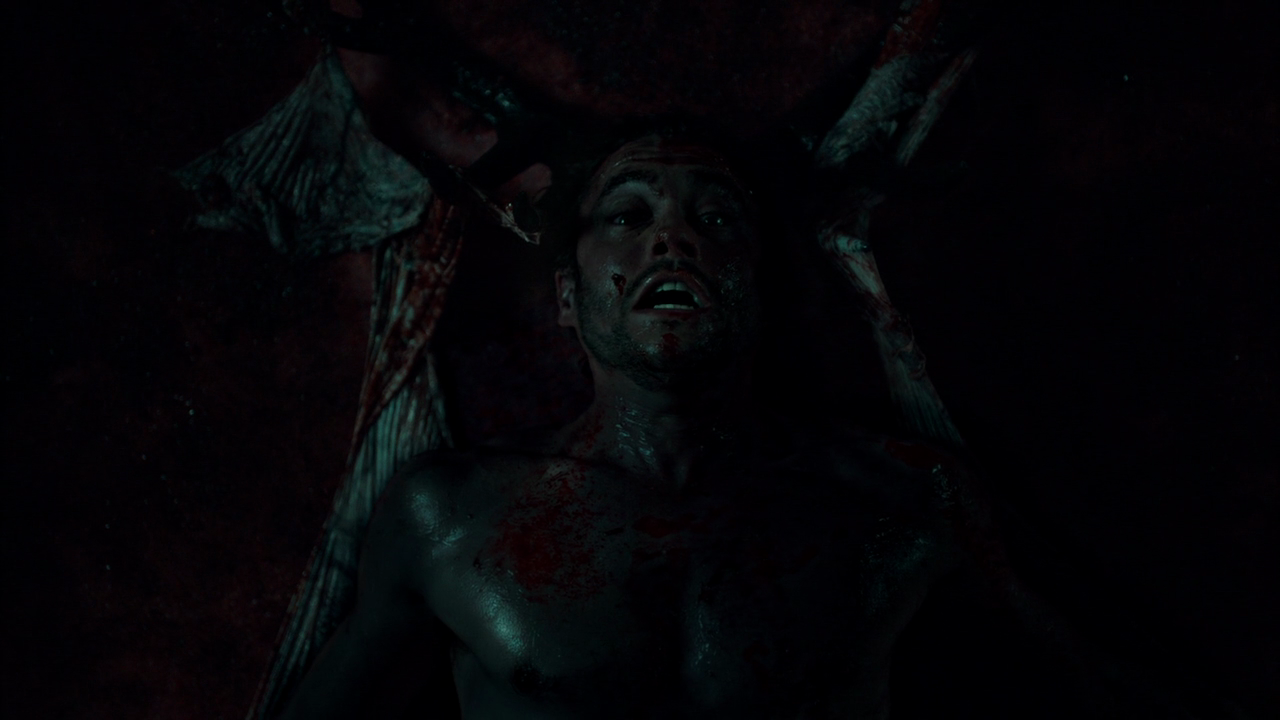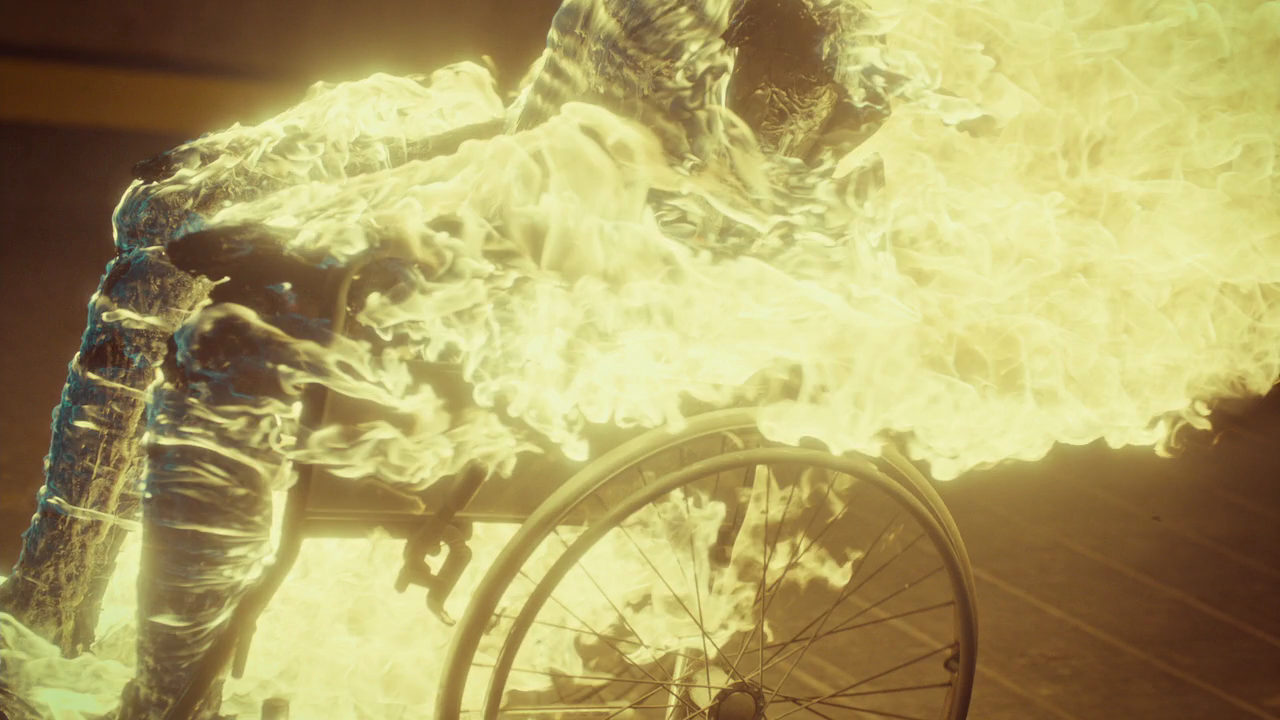The Proverbs of Hell 24/39: Kō No Mono
 KŌ NO MONO: An assortment of pickled vegetables. Janice Poon suggests that this signals the approaching denouement, and also makes a nice metaphor about the vegetables sharpening the senses, which is what Alanna needs. The reality is that the second season is not so much going off the rails as plummeting down the gorge, watching mournfully as the rails disappear into the sky.
KŌ NO MONO: An assortment of pickled vegetables. Janice Poon suggests that this signals the approaching denouement, and also makes a nice metaphor about the vegetables sharpening the senses, which is what Alanna needs. The reality is that the second season is not so much going off the rails as plummeting down the gorge, watching mournfully as the rails disappear into the sky.
The script calls this the Wildigo, which is the best part of the entire conceit. That a silly portmanteau is the best part speaks to the intense and pointless violence being done to the show’s narrative principles here. “Kō No Mono” is primarily structured around a cheap and theatrical bit of audience deception, maintaining the illusion that Will killed Freddie. This is already cheap – a way to manufacture drama out of structure when you obviously don’t have it in your actual character work. This is a common way for formally inventive storytelling to run aground – when the formal complexity becomes a way of making a story work in the first place instead of working better. Mostly Hannibal avoids it, not least because it’s got the core of the Harris books, which clearly and demonstrably do work dramatically. But here it’s out on a limb, dealing with stuff of its own invention and in the narratively tricky spot of mostly getting pieces lined up for a big dramatic finish, and it’s being found out.
But that is mostly a macro concern of the episode – a reason the whole doesn’t work. This specific scene, on the other hand, manifests a far more egregious problem. There have been various aspects of Will’s behavior that are hard to reconcile – we talked about his inexplicable sadism towards Freddie last week, for instance. And we’ll get to his at times bewildering mode of interaction with Alanna in good time, though that can mostly be reconciled. But those are questions of behavior. This, on the other hand, is firmly located in Will’s dreamscape. Hallucinatory as it may be, there is no room for subtle interpretations here – this scene is about Will’s horror at turning into Hannibal in the wake of killing Freddie. But, of course, he hasn’t done that. One doesn’t even really suspect he’d like to – Freddie annoys him, but his sense of murderousness has never focused on that. And using the dreamscape for narrative bluffing like this is massively problematic. The show can and does violate spacial and temporal coherence with aplomb in favor of this dream reality, but it can do this purely because of the implicit pact with the audience that the dreamscape is in a sense more real than mere reality – that it accurately captures the interior lives of the characters. To use the dreamscape for something that is mere narrative contrivance to generate unearned suspense is almost as fundamental a betrayal of the audience as abruptly caving on the “no sexual assault” rule would be.
HANNIBAL: Among gourmands, the ortolan bunting is considered a rare but debauched delicacy. A rite of passage, if you will. Preparation calls for the songbird to be drowned alive in Armagnac. It is then roasted and consumed whole in a single mouthful.
WILL GRAHAM: Ortolans are endangered.
HANNIBAL: Who amongst us is not?
WILL GRAHAM: I haven’t been gorged, drowned, plucked and roasted. Not yet.
HANNIBAL: Traditionally, during this meal, we’re to place shrouds over our heads, hiding our faces from God. I don’t hide from God.
I admit to an ambivalence about Hannibal’s cavalier consumption of an endangered species. It is not that it’s an out of character note – given that Hannibal is a cannibalistic serial killer there’s not really anything short of deliberate rudeness that one can point at and say “that’s an ethical line Hannibal wouldn’t cross.” Rather, my irritation is simply that it would in virtually every regard be more interesting if Hannibal draws the line at endangered species.
The ortolan bunting comes up in Hannibal Rising, but Fuller, amusingly, had to be told that because, by his own admission, that’s the book he knows least well.
HANNIBAL: Your design is evolving. Your choices affect the physical structures of your brain.
WILL GRAHAM: Killing’s changed the way I think.
HANNIBAL: You must understand that blood and breath are only elements undergoing change to fuel your radiance. Just as the source of light is burning.
Zero points for guessing which bit of this comes from Red Dragon, where it’s a description of Dolarhyde’s imagined sense of how Hannibal would understand him.
Adapted from Freddie’s actual death in Red Dragon, but used as a fake-out here because Fuller wisely didn’t want to do this to the now female version of the character. For my money, the impressive thing here is releasing the flaming wheelchair from the upper deck of a parking garage and managing to hit Freddie’s assigned space precisely.
MASON VERGER: Franklin, you can’t live there anymore with Mama and Shirley and Kitty Cat. You have to go away.
FRANKLIN: Who says?
MASON VERGER: The government says. Mama lost her job and her approval as a foster home. You can’t see her anymore after this week. Can’t see Kitty Cat after this week, either.
FRANKLIN: No.
MASON VERGER: Or maybe they just don’t want you anymore, Franklin. Is there something wrong with you?
Because the point that Mason is a grotesque sadist had not adequately been made. Astonishingly the scripted version of this is even more over the top, with an added bit where Mason tries to persuade Franklin that he has to murder Kitty Kat or else she’ll be agonizingly put to sleep. It is difficult to decide whether to praise them for realizing this was too much or complain that they didn’t realize the whole scene was too much. (Although it must be said, given that Mason is a pedophile in the books it’s easy to understand how they thought they might be being restrained.)
WILL GRAHAM: You’re worried I killed Freddie Lounds.
ALANA BLOOM: Did you?
WILL GRAHAM: What do you think?
ALANA BLOOM: I think that’s the wrong answer to tell somebody who is already wondering what you’re capable of.
At first glance, Will’s treatment of Alana seems to continue the annoying tendencies of the Freddie Lounds scene last week. But here, at least, his motivation for playing the situation with menacing ambiguity is understandable. Alana, after all, is actually close with Hannibal, and the risk of her ratting the plan out to him, whether deliberately or inadvertently, is real. On top of that, she’s someone whose good opinion Will genuinely values, making this an actually fraught interaction with real stakes. Indeed, its stakes are probably more interesting than the pseudo-drama being played out here.
WILL GRAHAM: Have you ever been a father?
HANNIBAL: I was to my sister. She wasn’t my child, but she was my charge. Abigail reminded me so much of her.
WILL GRAHAM: Then why did you kill her?
HANNIBAL: What happened to Abigail had to happen. There was no other way.
WILL GRAHAM: There was. But there isn’t now.
HANNIBAL: Would you protect this child the way you couldn’t protect Abigail?
WILL GRAHAM: I still dream about Abigail. I dream I’m teaching her how to fish.
HANNIBAL: I’m sorry I took that from you. I wish I could give it back.
WILL GRAHAM: So do I.
HANNIBAL: Occasionally, on purpose, I drop a teacup to shatter on the floor. I’m not satisfied when it doesn’t gather itself up again. Someday perhaps a cup will come together.
The teacup line is from Hannibal, and one of the more charmingly idiosyncratic details of the character. It combines his sense of envy towards god with a small and intimate scale that strips his ambition of its grandeur. The original context is not all that different – a reflection on Mischa – although the addition of Abigail to considerations makes things appreciably more complex and interesting.
WILL GRAHAM: You sacrificed Abigail. You cared about her as much as I did.
HANNIBAL: More. But then, how much has God sacrificed?
WILL GRAHAM: What god do you pray to?
HANNIBAL: I don’t pray. I have not been bothered by any considerations of deity, other than to recognize how my own modest actions pale beside those of God.
WILL GRAHAM: I prayed I would see Abigail again.
HANNIBAL: Your prayer did not go entirely unanswered. You saw part of her. Should the universe contract, should time reverse and teacups come together, a place could be made for Abigail in your world.
Hannibal’s dialogue draws further from the teacup bit of Hannibal, complete with the considerations of making places for people. (Originally the context involves his brainwashing of Clarice to believe that she’s Mischa.) All of this, of course, holds further resonance in the context of Abigail being alive, rooting this sequence (and the previous one) in two major reveals that are withheld from the audience. Of the two, Hannibal’s secret is probably the more narratively justifiable, being more in keeping with the show’s usual narrative approaches.
The best detail here, however, is firmly Hannibal’s assertion that he cared about Abigail more than Will did.
MASON VERGER: Poor Margot. You just can’t win. As long as you have it in you to produce an heir, you’ll be tempted. I have to remove that temptation. They’re going to find something wrong with your lady parts, Margot. Or so the record will state. The doctor will advise me that it’s best if they take everything. I’m afraid the only one you’ll be celebrating Mother’s Day with is me.
The other genuinely awful storytelling move in the episode – the show’s one major and substantial violation of its no sexual assault rule. Yes, there are other edge cases – most obviously the extraction of Mason’s semen in season three – but the rule, especially in the contest of Thomas Harris’s work, is one about violence against women, and so this becomes the big, ugly moment. And it’s awful – Margot powerless and weeping at the hands of someone the episode already came unusually close to suggesting is a pedophile, (“Maybe I took advantage, maybe I was rough with them if they wouldn’t take the chocolate and do what I said. I’m not holding anything back. It’s all okay now. I got a walk on all the charges.”) who is explicitly targeting her “lady bits.”
There is not actually a lot to say about this. It violates one of the show’s most important narrative compacts for little reason other than the show’s infatuation with Mason’s ostentatious villainy. Everything necessary for the plot here could have been done with subtlety and discretion. Instead we get a scene that wallows in the fact that sexual violence is being performed. It does permanent damage to the show’s ability to demand the audience’s trust. It’s just plain bad.
WILL GRAHAM: You think it was Margot’s idea to have an heir? Think it was your idea to take it from her? My idea to come here and kill you? What you, your sister and I all have in common is the same psychiatrist.
Will really needs to work out plans other than sending people to kill Hannibal. There’s a sterile banality to it that seems like little more than a clumsy attempt to force Mason to his preordained plot points, a problem that could just as easily have been solved by giving him things to do other than being a pantomime villain. Instead we get Will pulled in what is on the whole too many directions at once with regards to Hannibal, a final irritation in an episode with few interests other than getting episode twelve set up.



October 11, 2017 @ 12:35 pm
“Rather, my irritation is simply that it would in virtually every regard be more interesting if Hannibal draws the line at endangered species”.
This statement here perfectly encapsulates why I read the entirety of TARDIS Eruditorum despite having seen very little of the classic series. You possess an unique talent for looking at a work and seeing not only what is, but also what could and should have been. This – and the fact that you analyze complex, interesting works from a variety of fascinating angles – is why I love to read your essays almost regardless of subject. Thank you.
October 12, 2017 @ 7:42 am
“HANNIBAL: Occasionally, on purpose, I drop a teacup to shatter on the floor. I’m not satisfied when it doesn’t gather itself up again. Someday perhaps a cup will come together.”
CONFIRMED: Hannibal is a cat.